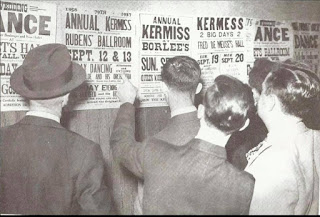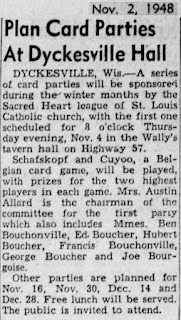What follows is a short email that I slapped together to share with a couple of my cousins. They'd ask "how do you know that?".... Sadly I haven't been able to determine with Marcel died, so I never really put the finishing touches on what follows.
What we know, and how.
There are a few big names when it comes to what we know about our Belgian ancestors. What we know today is built on a lot of shoulders. Sometimes it's interesting to stop and research the researchers. Hopefully knowing a bit about them can inspire others.
One of the earliest sources was Charles I. Martin (1857-1894), who wrote on the History of Door county in 1881. His book biographies of nearly seven hundred families, and mention of 4,000 persons.
Mathias Tlachac Sr (1829-1924), Born in Bohemia, dying in Door County. His interest in genealogy and history later led him to write a series of 10 articles about The History of the Belgian settlements in Door, Kewaunee and Brown counties. They were printed after his death in 1973 by the Algoma Record-Herald.
Hjalmar Rued Holand (1872-1963) A Norwegian-American historian and author of a number of books and numerous articles principally dealing with the history of Door County. ie. Wisconsin's Belgian Community in 1931.
There are three big names of recent times that come to mind.
The first was Mary Ann Defnet (1930-2016) of Green Bay. She was a founding member of the Bay Area Genealogical Society, Vice-President and Historian of the Peninsula Belgian-American Club, a member of the Brown County Historical Society, the Belgian Researchers, the Wallonie-Wisconsin Society, the Center for Belgian Culture, and was a 35 year member of the Wisconsin State Genealogical Society.
She researched and wrote the entire Belgian section of the “Farewell to the homeland: European immigration to N.E. Wisconsin, 1840-1900” She spent countless days at the UWGB research center where all the delcations of intent and other documents are filed. She compiled a list of all the Belgian’s who settled in the area with their dates of arrival.
Father Jean Ducat (1922-2016) of Biesme, Belgium is a gentleman from Belgium who compiled lists of Belgian passengers who left for America. He was a parish priest and later a professor of Catholic doctrine at the Gosselies State College. He was president of the Archeo-Paleonto-Historique de Charleroi and member of the Wallonie -Wisconsin Association. He worked with Mary.
Marcel Lacourt of (1924-?) Vitrival, Belgium created a list of over 18,000 Belgians who left the country and came to the US. His spreadsheet denotes birth dates, origin, ship names, landing port, destination. (He died about 2010-12), I am still trying to find out) Marcel spent quite some time in Wisconsin doing local research.
Previously mentioned the Peninsula Belgian-American Club. It was formed in the late 1960’s in Door County. They have been helping arrange trips back to Belgium, at regular intervals. This started in the early 70’s with hundreds of Belgian Americans going back to reconnect. The Wallonie-Wisconsin association, is the sister organization in Belgium, for those looking to reconnect and visit here.
Also definitely worth mentioning is The Belgian Researchers. It was founded in 1976 by Micheline Gaudette and Ardiena Stegen. They publish Belgian Laces. This publication has the stories of Belgian immigrants, their role and contribution to the development of particular industries in the US as well as their stories of the trials and tribulations connected with starting a new life in a new country. A special feature of the magazine is the "Queries", in which members desiring information about a particular person or event can submit a query in the hope that someone will be able to help.
There are many other people and sources, but these are just a few off the stop of my head. When looking into other ethnic backgrounds, similarly looking into who and what has been others have done is probably the most important piece of help you will have. Step one is always to visit the library of the area you are researching. Visit the local history / genealogy department and ask the librarian what they have that no one else has in their reference section.











